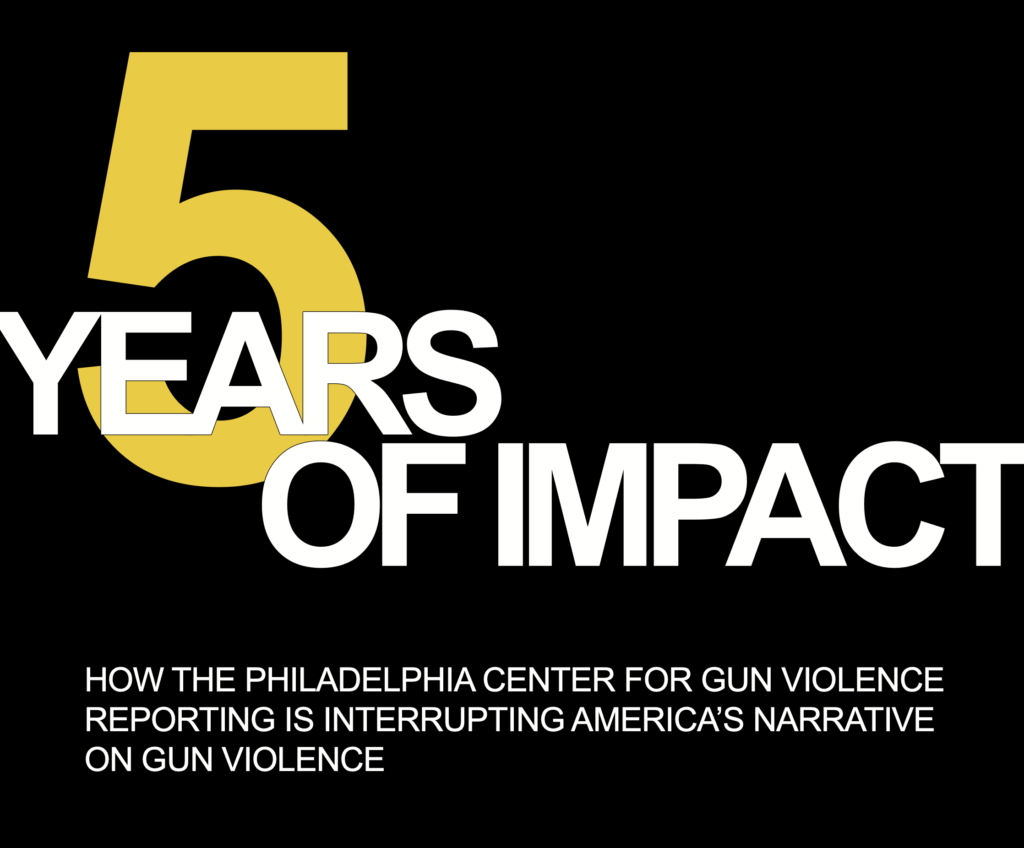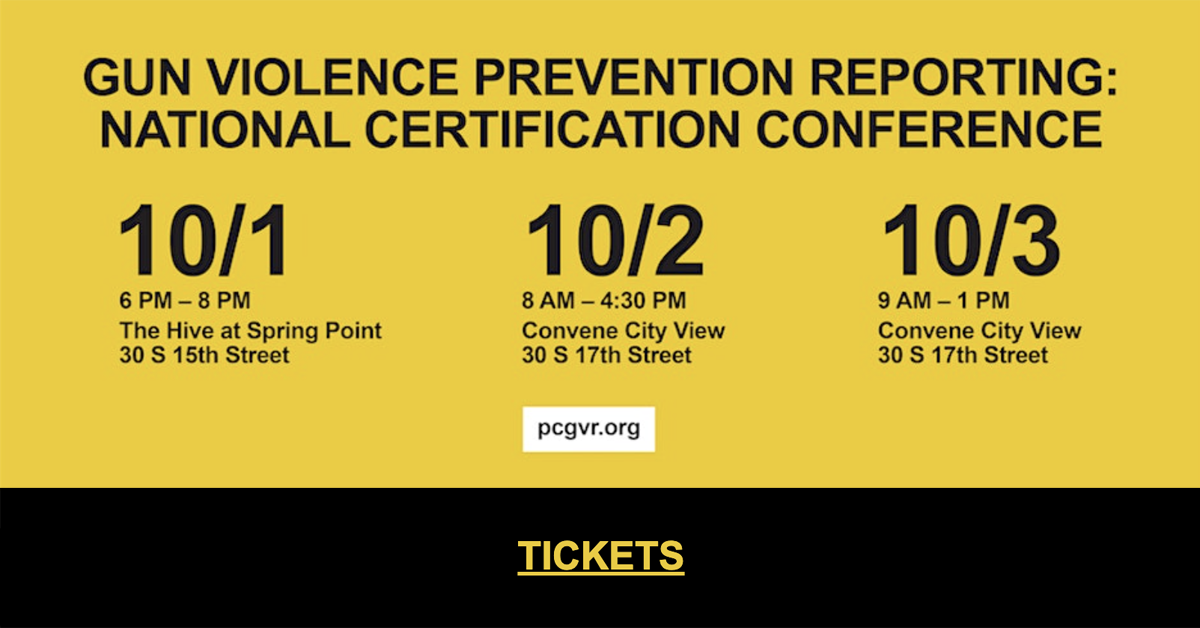REGISTER NOW
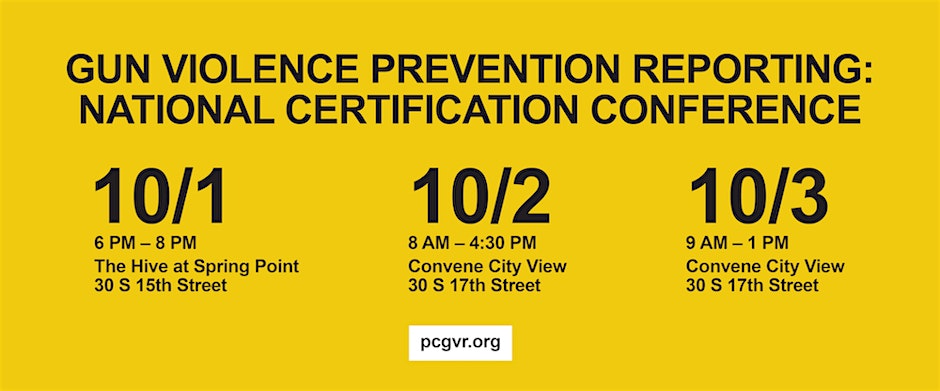
TICKETS
Take a deep dive into everything we have learned during our first five years of bringing together journalists, researchers and experts from the gun violence survivor community. This conference is designed for journalists but beneficial for anyone focused on prevention.
WHO YOU’LL HEAR FROM
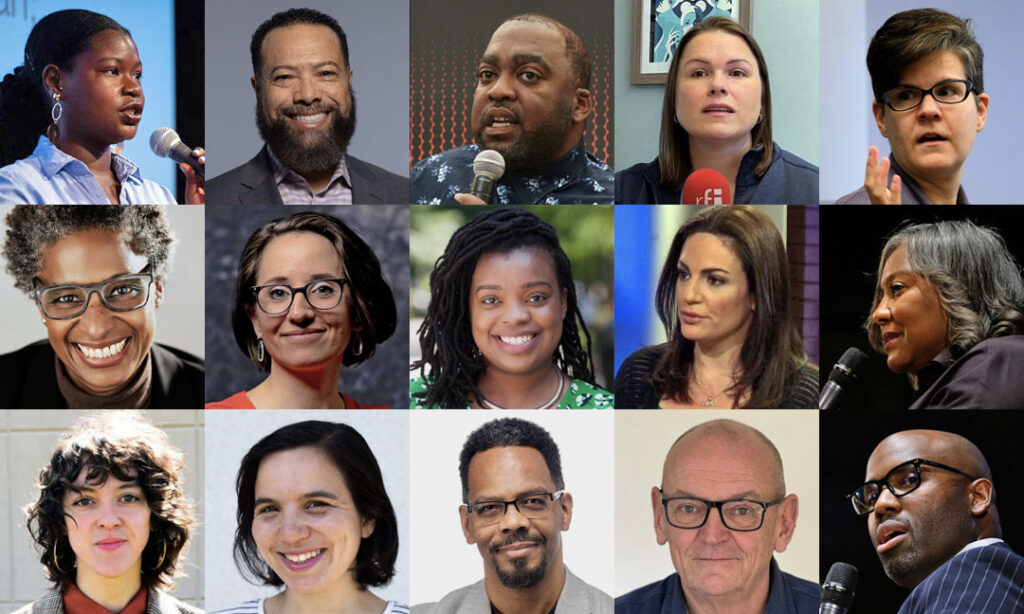
PRESENTERS, PANELISTS AND WORKSHOP LEADERS
Top row, left to right:
Abené Clayton, Reporter for the Guns and Lies in America project at The Guardian and co-director of the Association of Gun Violence Reporters
Dr. H. Jean Wright II, Executive Deputy Commissioner, Department of Health and Mental Hygiene, New York City.
Oronde McClain, PCGVR Survivor Connection Director
Dr. Jessica Beard, PCGVR Director of Research
Prof. Jennifer Midberry, Temple University Department of Journalism, partner in PCGVR multidisciplinary research collaborative and former photojournalist
Second row:
Prof. Yvonne Latty, Director of the Logan Center for Urban Investigative Reporting at Temple University
Tamara Cherry, journalist, author of The Trauma Beat and founder of Pickup Communications
Cheryl Thompson-Morton, Head of Advisory Programs, Lenfest Institute for Journalism, adjunct faculty member at the Poynter Institute
Jennifer Mascia, founding staff member and senior news writer at The Trace
Angela Wade, The Second Trauma.
Bottom row:
Paige Pfleger, Senior Criminal Justice Reporter at WPLN News, Nashville Public Radio
Sammy Caiola, Special Projects Reporter at the Kensington Voice in Philadelphia and co-director of the Association of Gun Violence Reporters
Eric Marsh, Sr., PCGVR Director of Operations
Jim MacMillan, PCGVR Founder and Director
Armond James, The Second Trauma
SPECIAL OFFER: FREE AGVR MEMBERSHIP
When you register, you will also be invited to claim a free one year (professional or associate) membership in the Association of Gun Violence Reporters, who will also have a panel at the conference. AGVR.org
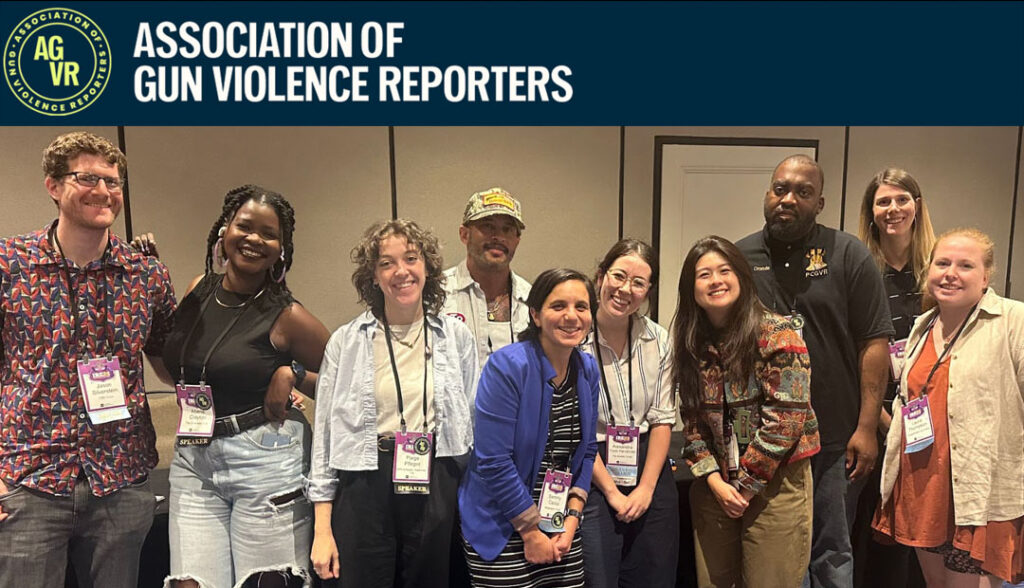
Above: AGVR staffers, members, partners and guests gather at Health Journalism 2025 last spring in Los Angeles.
“Beyond these precious lives that are lost to firearm violence, there are wider ripples of harm to those who are injured, who witnessed the incidents, who live in urban and rural communities where such violence takes place, and who constantly read and hear about firearm violence in the news.” — U.S. Surgeon General’s Advisory on Firearm Violence, 2024
WHAT WE’LL COVER
Wednesday, October 1 at The Hive at Spring Point
30 South 15th Street, Philadelphia
6-8 p.m.
Opening reception: Meet the conference faculty, PCGVR leaders and the team from our recently-expanded national Association of Gun Violence Reporters.
Brief comments:
Dr. Jessica Beard, PCGVR Director of Research
Oronde McClain, PCGVR Survivor Connection Director
Eric Marsh, Sr., PCGVR Director of Operations
Jim MacMillan, PCGVR Founder and Director
Host:
Tamara Cherry, journalist, author of The Trauma Beat and founder of Pickup Communications
Thursday, October 2 at Convene City View
30 South 17th Street, Philadelphia
8 a.m. – 5 p.m.
8:00 a.m. Breakfast
9:00 a.m. Welcome, Goals and Program Overview
Abené Clayton, Reporter for the Guns and Lies in America project at The Guardian and co-director of the Association of Gun Violence Reporters
Tamara Cherry, journalist, author of The Trauma Beat and founder of Pickup Communications. Cheryl Thompson-Morton, Head of Advisory Programs, Lenfest Institute for Journalism, adjunct faculty member at the Poynter Institute.
9:30 a.m. Kickoff Workshop
10:15 a.m. Coffee break
10:30 a.m. Keynote
Dr. H. Jean Wright II, Executive Deputy Commissioner, Department of Health and Mental Hygiene, New York City. His talk will help journalists better understand the experiences and perspectives of people who have been harmed by gun violence.
11:30 a.m. The Second Trauma: documentary screening and survivor community panel
Panelists:
Prof. Yvonne Latty, Director of the Logan Center for Urban Investigative Reporting at Temple University and producer and director of the film.
Oronde McClain, PCGVR Survivor Connection director, Stoneleigh Foundation Emerging Leader Fellow, co-producer and host of film, and a gun violence survivor.
Angela Wade and Armond James, who appear in the film.
Moderator:
Tamara Cherry, journalist, author of The Trauma Beat and founder of Pickup Communications
12:30 p.m. Lunch
1:30 p.m. Journalism and Trauma
Sammy Caiola, Special Projects Reporter at the Kensington Voice in Philadelphia, co-director of the Association of Gun Violence Reporters, former gun violence prevention reporter at WHYY public radio in Philadelphia and Fellow, Global Center for Journalism and Trauma, formerly the Dart Center.
2:15 p.m. Framing, Solutions Journalism, & Peace Journalism
Prof. Jennifer Midberry, Temple University Department of Journalism, partner in PCGVR multidisciplinary research collaborative and former photojournalist.
3:00 p.m. Coffee break
3:15 p.m. Public Health Framing, Prevention, & Gun Violence Prevention Reporting
Dr. Jessica Beard, PCGVR Director or Research, Stoneleigh Foundation Fellow and Temple University Hospital trauma surgeon.
4:00 p.m. Workshop Breakouts
4:45 p.m. Day 1 Wrap Up
5:00 p.m. On your own: Enjoy an evening in Philadelphia
Friday, October 3 at Convene City View
30 South 17th Street, Philadelphia
8 a.m. – 1 p.m.
8:00 a.m. Breakfast
9:00 a.m. Putting ideas into practice, implementing them in them newsroom
Cheryl Thompson-Morton, Head of Advisory Programs, Lenfest Institute for Journalism, adjunct faculty member at the Poynter Institute and formerly the Black Media Initiative Director at the Center for Community Media at the Craig Newmark Graduate School of Journalism at CUNY.
9:45 a.m. Prevention Reporting Plan (Small Groups)
10:15 a.m. Prevention Reporting Plan: Group Wrap Up
10:30 a.m. Coffee Break
10:45 a.m. Panel: Association of Gun Violence Reporters
Panelists:
Sammy Caiola, Special Projects Reporter at the Kensington Voice in Philadelphia, former gun violence prevention reporter at WHYY and fellow at the Global Center for Journalism and Trauma
Abené Clayton, Reporter for the Guns and Lies in America project at The Guardian
Jennifer Mascia, founding staff member and senior news writer at The Trace
Paige Pfleger, Senior Criminal Justice Reporter at WPLN News, Nashville Public Radio
Moderator:
Eric Marsh, PCGVR Director of Operations
11:30 a.m. Closing comments
Dr. Jessica Beard, PCGVR Director of Research
Oronde McClain, PCGVR Survivor Connection Director
Eric Marsh, PCGVR Director of Operations
Jim MacMillan, PCGVR Founder and Director
12:00 p.m. Box lunch; take away or stay and network
1:00 p.m. Event concludes
KEYNOTE: DR. H JEAN WRIGHT II
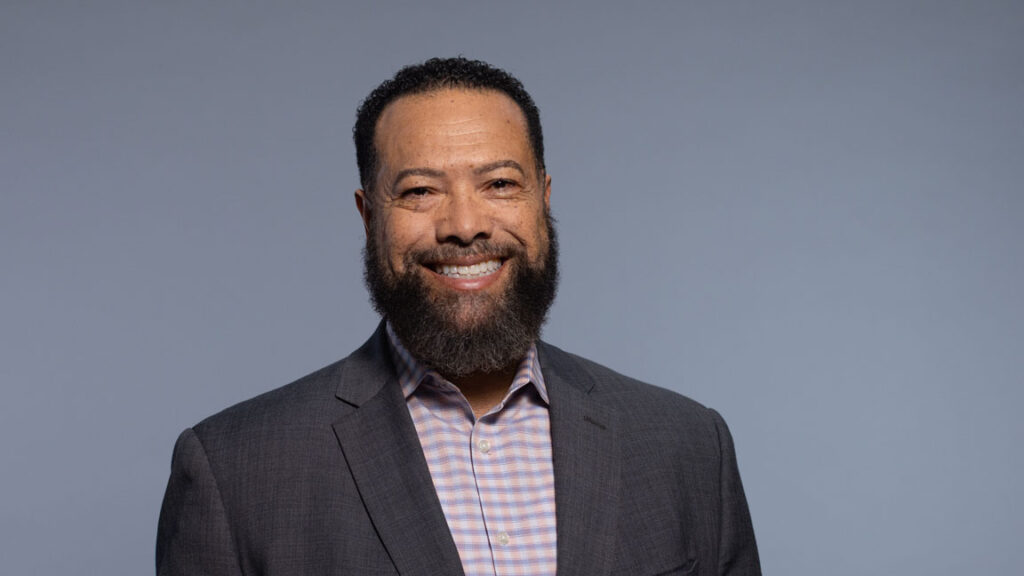
We are excited to share that Dr. H. Jean Wright II will keynote our upcoming Gun Violence Prevention Reporting National Certification Conference. His talk will help journalists better understand the experiences and perspectives of people who have been harmed by gun violence when reporting on the topic or covering incidents.
Biography
Dr. H. Jean Wright II, PsyD. MDiv, was appointed as New York City’s Department of Health and Mental Hygiene’s Executive Deputy Commissioner of the Division of Mental Hygiene, which Oversees the Agency’s Work on Mental Health, Alcohol and Drug Use Prevention, Health Promotion for Justice-Impacted Populations, Care and Treatment and Children Youth and Families, Among Other Bureaus on August 23, 2024.
Wright is a clinical and forensic psychologist who brings two decades of transformational leadership experience in behavioral health in government, private practice, rehabilitation, and academia to his new role at the Health Department.
During his time in Philadelphia, Dr. Wright was the Deputy Commissioner for DBHIDS, and the Director for the Behavioral Health and Justice Division at DBHIDS where he helped develop and oversee programs and initiatives to support people returning from state psychiatric hospitalization, state penitentiary, and county jail. This work involved alliance-building across sectors, implementing trauma-focused practices to deliver behavioral health care to target populations, as well as trainings of service providers.
He is an Adjunct Professor at Temple University in the Department of Psychology and has served on a variety of boards, including The Mayor’s Task Force on Reintegration and The Philadelphia Board of Mental Health.
Dr. Wright earned a bachelor’s degree in psychology, English literature, and cultural studies from The Ohio State University, a master’s in divinity from the United Lutheran Seminary, and a doctorate in psychology with focus in clinical and forensic psychology from Wright State University. He continued with post-doctoral work at Wilberforce University and Cincinnati VA Medical Center.
FIVE YEARS OF ACTIVITIES
Above: PCGVR activities, events, appearances and collaborations, 2020-2025
ABOUT PCGVR
We collaborate with journalists, researchers and the gun violence survivor community to advance more empathetic, ethical and impactful reporting on gun violence and prevention.
Our work is trauma-informed, evidence-based, rigorous, authoritative and focused on solutions. Our work has informed The Associated Press Stylebook, the U.S. Surgeon General’s Advisory on Firearm Violence, The Commonwealth of Pennsylvania Resources for Victims of Gun Violence Initiative and more than 150 news reports.
Our team has presented at events hosted by the Association of Health Care Journalists, the Online News Association, Investigative Reporters and Editors, National Press Club, National Press Foundation, Radio Television Digital News Association, the International Communication Association, the Association for Education in Journalism and Mass Communication and the United States Center for Disease Control and Prevention.
By curating connections, cultivating trust, and conducting collaborative research, we inform journalistic practices and influence the programs and policies that will ultimately lead to a more nuanced, public health-focused approach and fewer people harmed by gun violence. Through vigorous, peer-reviewed research, we are forging a new path for gun violence reporting that prevents harm, promotes healing, and rewrites the narrative of gun violence in America.
Gun violence is not inevitable. It is preventable. The time has come to tell this story.
GETTING READY
FAQS
Q: Is this a workshop for crime beat reporters?
A: Not especially. Yes, attending this conference will benefit those covering crime, law enforcement, criminal justice or breaking news. But journalists covering health, business, technology, sports, music, arts, travel, education, government and just about any topic can find themselves reporting on gun violence with little or no warning or preparation. We’re here to help. Editors and news execs should sign up too!
Q: Do you have to be a journalist to attend?
A: Not at all. We convene journalists, researchers and the survivor community at all of our events but additional experts from public health, prevention and nonprofits, police and fire officials, educators, high school and college students attended our first national conference. We even had one former mayor of Philadelphia in the audience.
Q: Will there be homework? Is there a test?
A: Nope. There’s no homework and there are no exams. Certification simply requires attending five sessions and participating in related workshop activities taking place all day Thursday and then again Friday morning. The opening reception is optional, as well as some other sessions.
Q: What’s the goal of this conference?
A: We strive to advance more trauma-informed and community-informed journalistic practices and illuminate evidence-based solutions leading to better gun violence reporting and fewer people harmed by gun violence.
WHAT THEY SAID LAST TIME

Thinking about attending our national conference on gun violence prevention reporting? Here’s what participants had to say after our local pilot:
“Every journalist needs to take this training.”
“This has been needed for a long time.”
“It’s education and insight for everyone.”
“This was one of the best trainings I ever went to. Very impactful.”
“Engrossing and informative.”
“It was a great training with a phenomenal team!”
“It was rich with specific, actionable insights.”
“I would recommend this training to all of my colleagues who cover crime.”
“This training was extremely insightful.”
“Today was great. Practical, solutions-focused, honest.”
“This training is great and needs to continue.”
“Great work! I hope this is offered on a regular basis.”
“It was really inspiring to be in community with folks who came at this work from so many different angles.”
“This type of work is sorely needed.”
“I love what you all are doing. It is groundbreaking work.”
“This was a great workshop.”
WHAT YOU’LL GET
• You will attend presentations, join conversations and participate in workshop activities. You will also get breaks to ingest the experience, to network, recharge, refuel and continue.
• You will get certified by the team at PCGVR: the nation’s most recognized thought leaders on gun violence, prevention and the role of the media.
• You will also get healthy meals meeting every need in state-of-the-art venues located in the middle of an incredible city.
• But most importantly: You will become part of this network of experts and inform our work moving forward. This is PCGVR:
HOW IT MIGHT FEEL
This will be our first national gathering since our inaugural Better Gun Violence Reporting Summit just before the pandemic in late 2019. Here’s a look back:
VISITING PHILADELPHIA
The event venues are close to each other, close to Philadelphia City Hall, and not far from Rittenhouse Square, all in the Center City section of Philadelphia. And not far from Amtrak’s 30th Street Station.
October 1 at The Hive at Spring Point
30 South 15th Street, Philadelphia
MAP
October 2 and 3 at Convene City View
30 South 17th Street, Philadelphia
MAP
We expect to announce a hotel block offer soon at $169 per night but there are many comparable hotel choices in the area.
Visitor guide: visitphilly.com
Mass transit: septa.org
OUR GRATITUDE
We are bringing everything we have learned during our first five years to this conference and as we reflect, we are brimming with gratitude for everyone who has made this work possilbe.
Gratitude for every survivor and co-victim who shared their expertise and with it, their pain — in our research, our workshops, our panels, in virtually every tool we’ve created — with hopes of making someone else’s experience with the media healing instead of harmful, and to hopefully prevent more violence.
Gratitude for every journalist, every newsroom manager, every J-School instructor who has taken an interest in our work, attended one of our panels, our trainings, our screenings, or just perused our website for resources that can help them do this very important job, better.
Gratitude for our donors, without whom the impact we’ve had over the past five years would still be an idea, a dream, a frustration.
FOR THEIR FUNDING SUPPORT:
The Stoneleigh Foundation • Independence Public Media Foundation • Spring Point Partners • Knight Foundation • The William Penn Foundation • HFGF • Knight-Lenfest Local News Transformation Fund • The Lenfest Institute for Journalism • The Alfred and Mary Douty Foundation • Reynolds Journalism Institute at the University of Missouri • Philadelphia Office of Violence Prevention • The Barra Foundation Directors Grant Program
FOR THEIR SUPPORT IN KIND:
WHYY • Philadelphia Association of Black Journalists • Reynolds Journalism Institute at the University of Missouri • Mothers in Charge • AH Datalytics • Action Tank • The Scattergood Foundation • Resolve Philly • Fels Lab at the University of Pennsylvania
FOR THEIR PARTNERSHIP:
Columbia Journalism Review • Global Center for Journalism and Trauma • The Guardian: Guns and Lies • Guns & America, WAMU • Johns Hopkins Center for Gun Violence Solutions • Kouvenda Media • Logan Center for Urban Investigative Reporting • Mothers in Charge • Need in Deed • Philadelphia Association of Black Journalists • Philadelphia Obituary Project • Revive Radio • Seeking Solutions: Gun Violence in Missouri • The Student Vanguard at Community College of Philadelphia • The Trace & Up the Block • YEAH Philly • Zero Homicides Now • WHYY & Billy Penn • WURD Radio • 5 Shorts Project
FOR THEIR RESEARCH PARTNERSHIP:
Christopher Morrison • Jennifer Midberry • Sara Jacoby • Iman Afif • Anita Wamakima • Evan Eschliman • Leah Roberts • Shannon Trombley • Tia Walker • Laura Partain • Siena Wanders • Tyrone Muns • Kallie Palm
And we will be most grateful once again if you can join us this fall in Philadelphia.
PUTING THESE IDEAS INTO PRACTICE
Violence prevention reporter Alain Bookman of AL.com attended our first certification workshop in 2023 and shared her experience with bringing that guidance back to her newsroom during this webinar:
• Listen to the whole webinar here: Gun violence reporting certification: What it is and why journalists should get it
• And read this new interview with Alaina: How a local reporter sheds light on gun violence in her community
“The community members I’ve spoken to have talked about being tired of reading a constant flood of crime news. Instead, they want to know what’s being done to stop the violence… The violence prevention beat allowed me to take more time to get to know the community beyond shootings and homicides.” — Alaina Bookman, AL.com
NEWS AND RESOURCES FROM PCGVR
LATEST RESEARCH
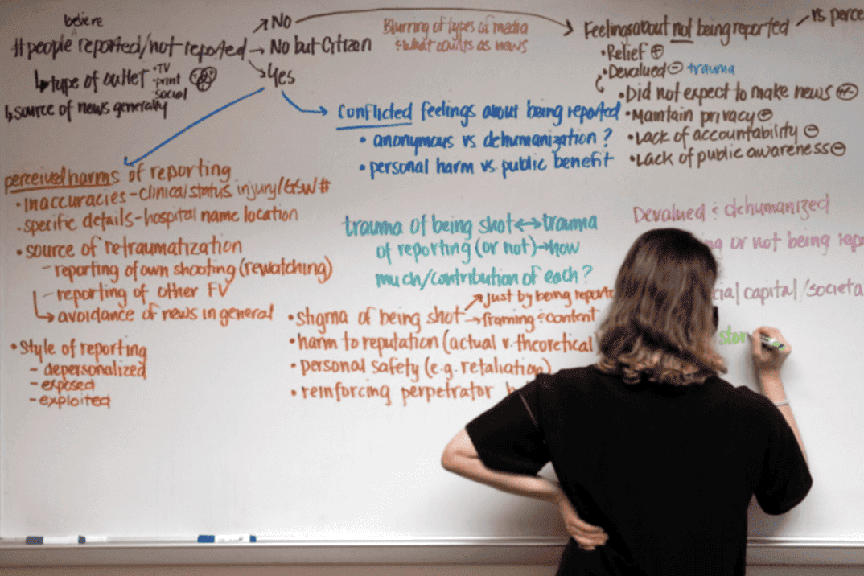
Our center facilitates a multidisciplinary research collaborative which informs our work and has published four studies to date on gun violence, prevention and the role of the media.
MORE INFOREPORTING TOOLKIT

By changing the way gun violence is covered, reporters can take an active role in minimizing harm to injured people, communities, and society—and even make an important contribution toward preventing gun violence.
MORE INFOCENTERING SURVIVORS
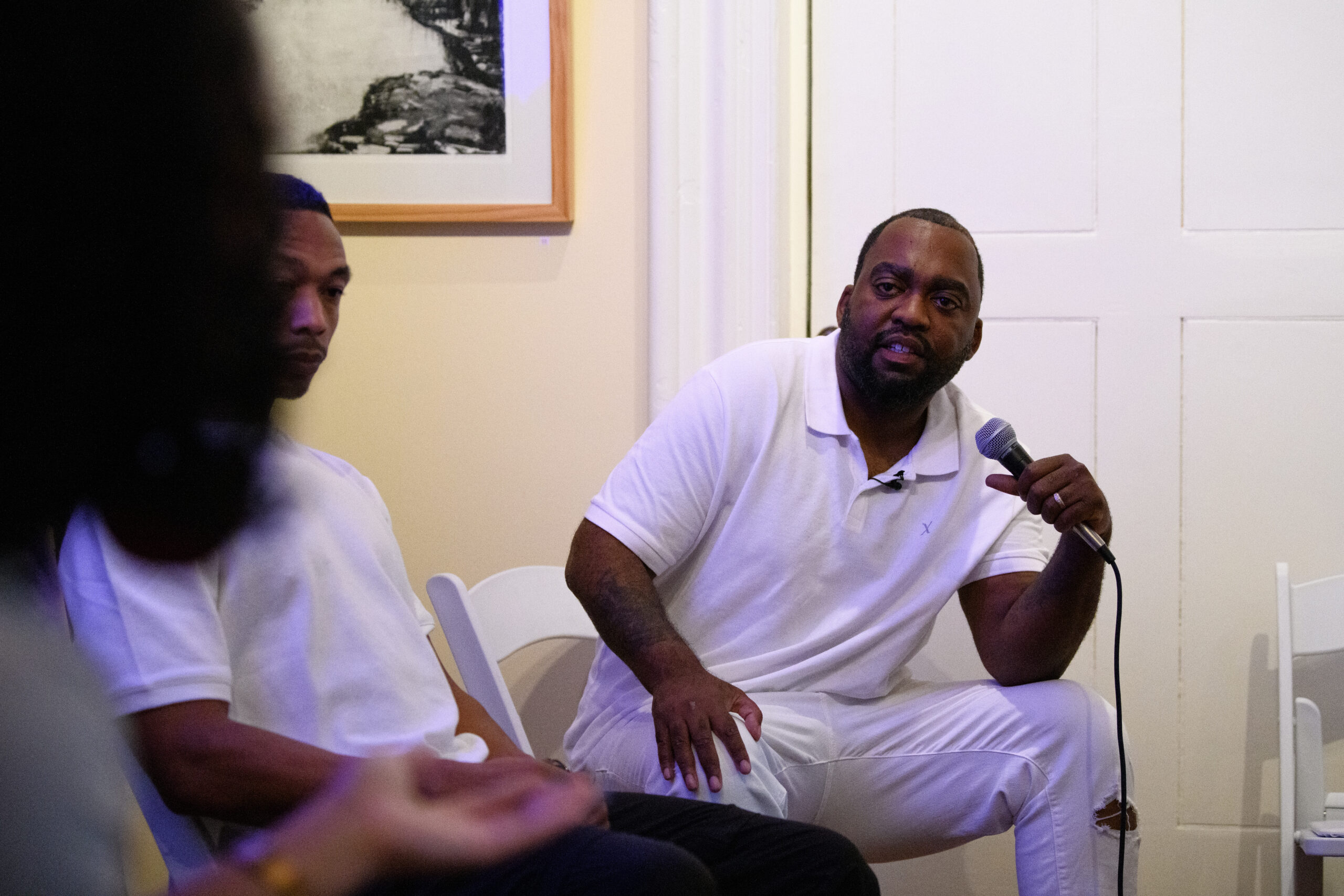
Gun violence is preventable. Journalists can make a difference. The Survivor Connection is a new service intended to help those reporting on gun violence take a more informed approach.
MORE INFOWORTH LISTENING
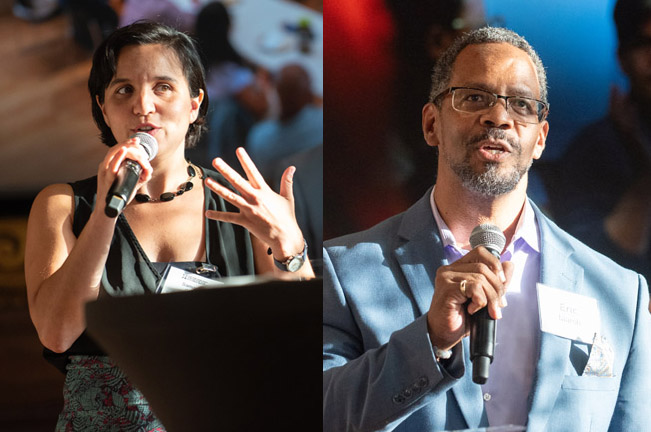
Association of Gun Violence Reporters co-director Sammy Caiola and PCGVR director of operations Eric Marsh discuss their work.
LISTENWORTH READING
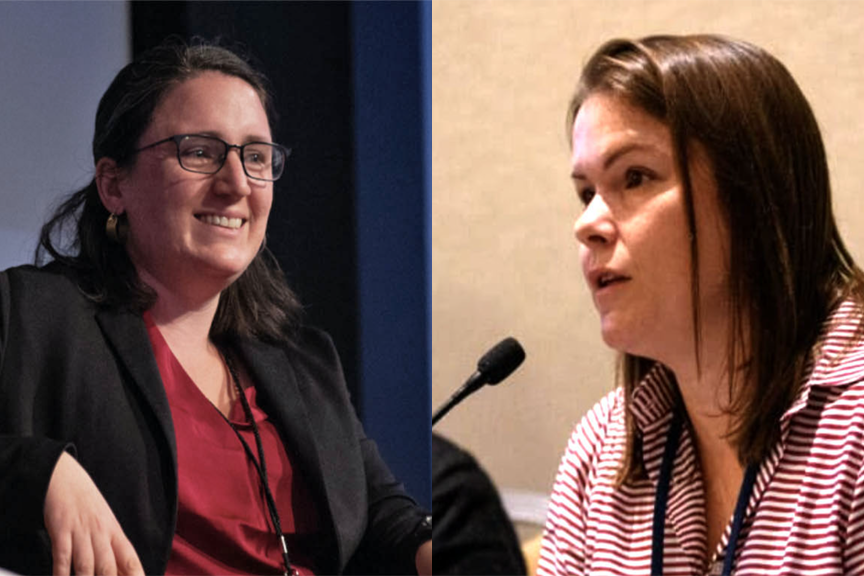
Our director of research Dr. Jessica Beard and colleague Dr. Elinore Kaufman say federal research funding cuts will put gun violence prevention at risk.
READWORTH WATCHING
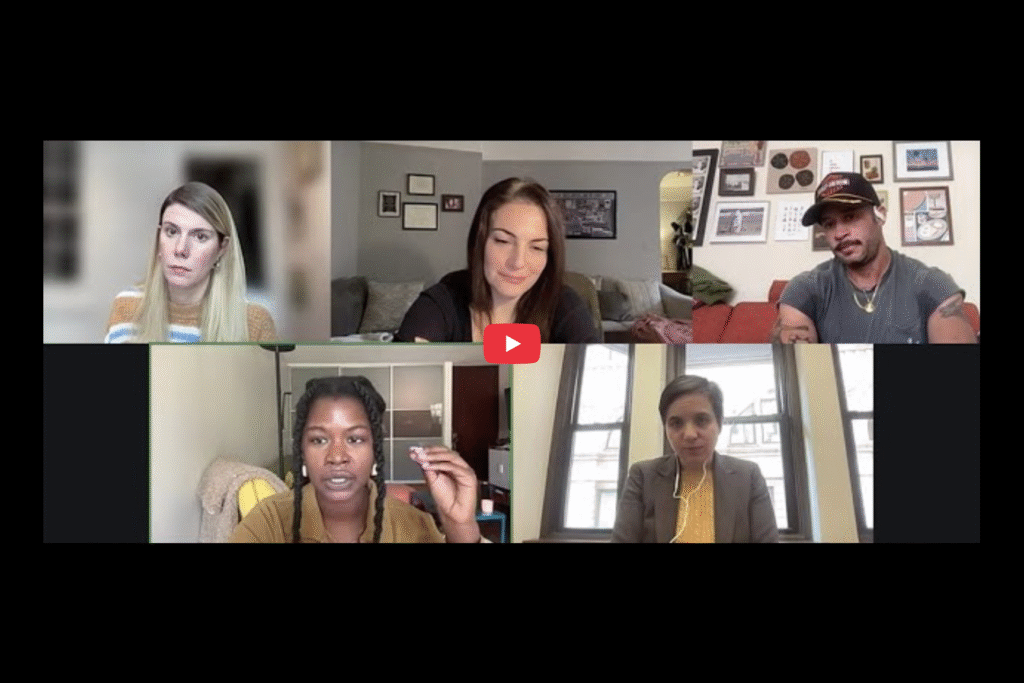
Get to know several of the key figures from our emerging Association of Gun Violence Reporters in this kickoff webinar.
WATCHWORTH EXPLORING
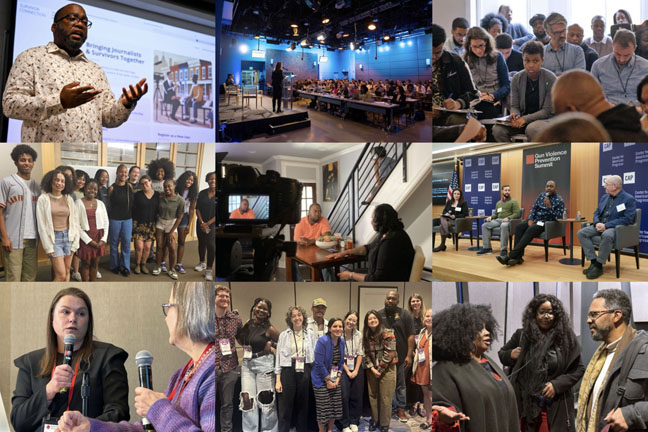
Are we making a difference? We have certainly been there at a few important turning points during the past five year.
EXPLOREMORE SITES TO SEE
GUN VIOLENCE REPORTERS

AGVR helps reporters tell more nuanced, solutions-forward stories about gun violence in hopes of minimizing harm to survivors while advancing public health-informed, trauma-aware and community-centered journalism.
MORE INFOSURVIVOR CONNECTION

Philadelphia journalists are invited to access this directory of local community experts, who have each taken part in our introductory workshop on trauma, media literacy and public health responses to gun violence.
MORE INFOTHE SECOND TRAUMA

This 25-minute documentary shows the effects of episodic gun violence reporting on survivors and co-victims and offers solutions on how we can do better to shift the narrative to a public health focus and give power back to the community.
MORE INFO